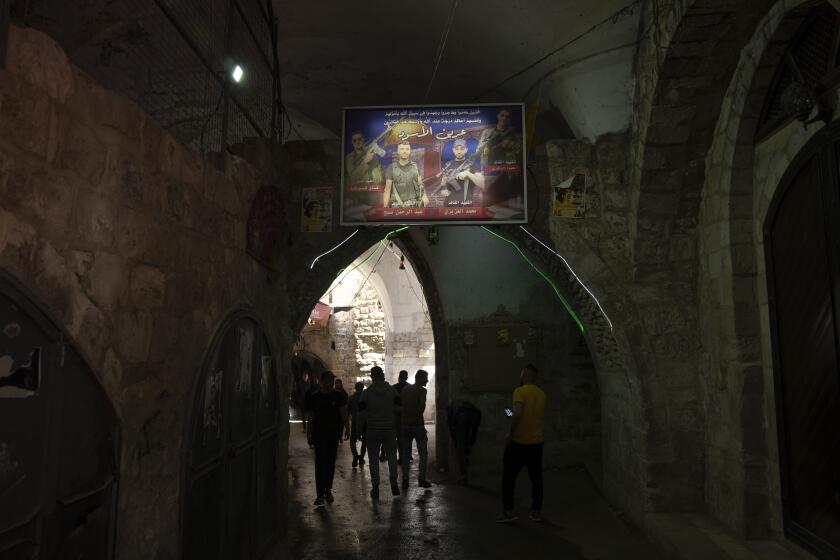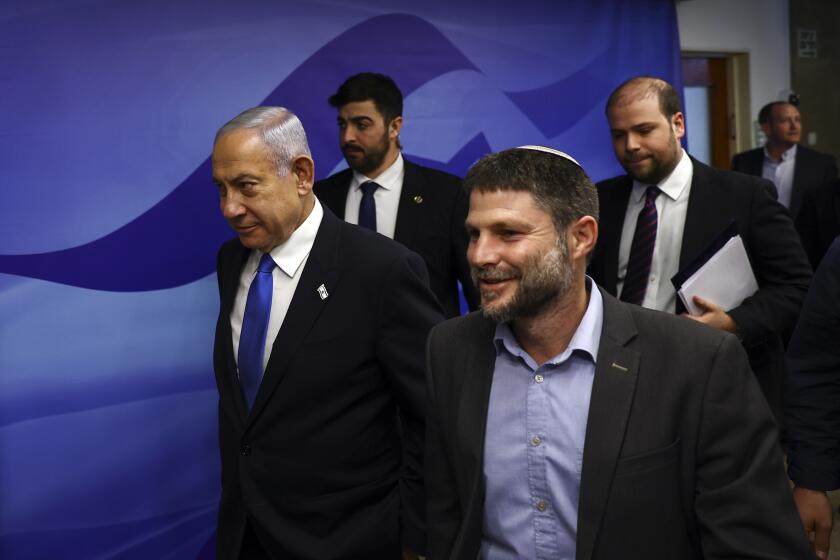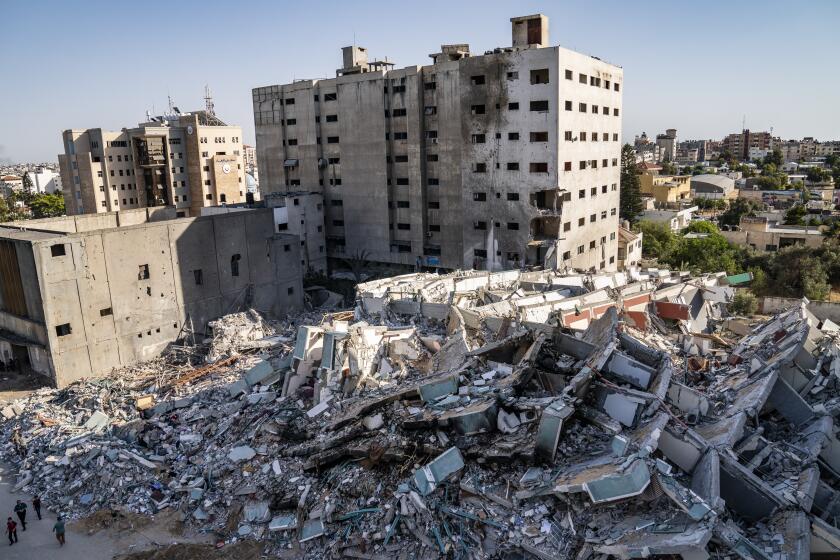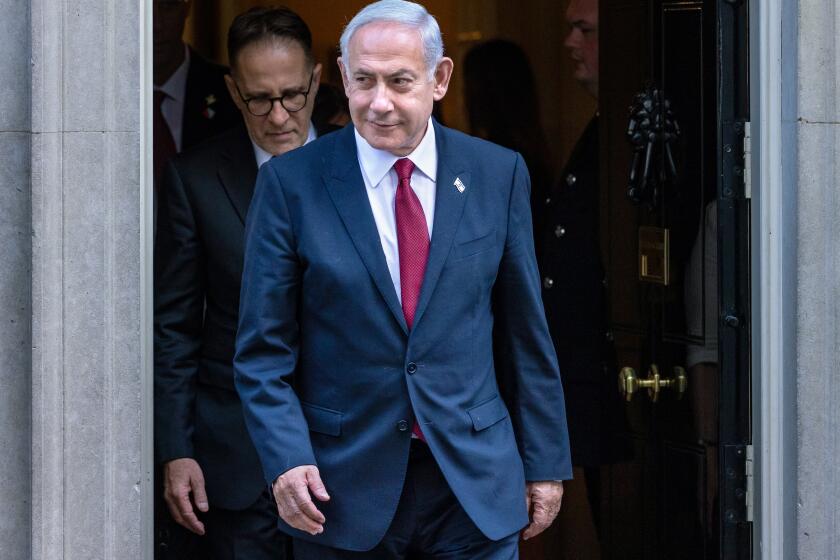13 dead, including senior militants but also children, in Israeli airstrikes on Gaza
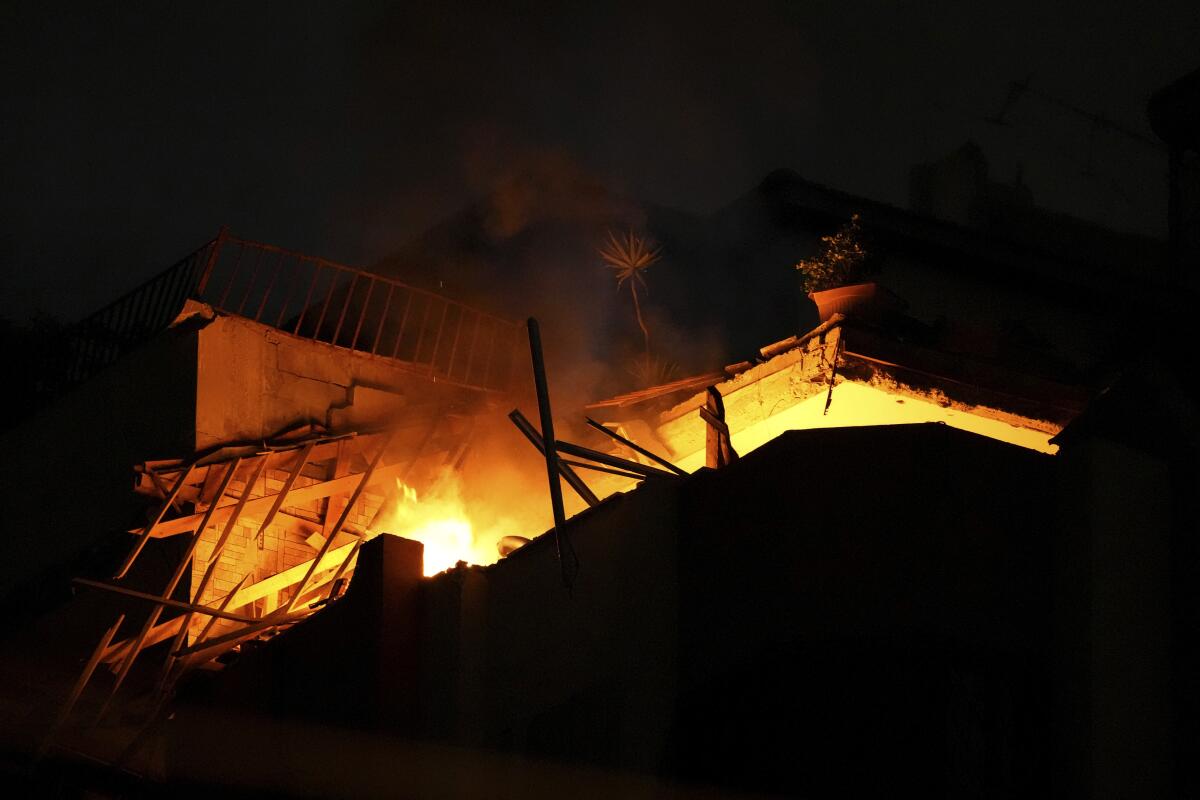
- Share via
GAZA CITY — Israel carried out a series of targeted airstrikes in densely populated areas of the Gaza Strip early Tuesday, killing three senior commanders of the Islamic Jihad militant group and at least 10 civilians, Palestinian health officials said. Two of the commanders’ wives, several of their children and other bystanders were among the dead.
The attacks set the stage for what is likely to be a new round of heavy fighting. They hit the top floor of an apartment building and a house in Gaza City, and a third house in the southern town of Rafah. The Palestinian Health Ministry said that 20 people were wounded and that some were in serious or critical condition.
Israel said it targeted several militant training sites as well before the airstrikes halted at daybreak. After a lull, the Israeli military said that warplanes struck militants carrying antitank guided missiles in the enclave’s southern city of Khan Younis later Tuesday. The Palestinian Civil Defense reported that two people were killed, without immediately providing their identities.
At midday, tens of thousands of people took part in two funerals, with at least 10 bodies carried on stretchers through the streets in a mass procession in Gaza City. Children’s coffins were carried next to those of their parents.
Such targeted killings are rare, and in the past, Palestinian militant groups have retaliated with heavy barrages of rocket fire.
In anticipation of Palestinian rocket attacks in response to the airstrikes, the Israeli military advised residents of communities within 25 miles of Gaza to stay close to designated bomb shelters.
The killing of a 23-year-old Palestinian in April marked the first slaying of a suspected Israeli intelligence collaborator in nearly two decades.
Israel’s Home Front command ordered the closure of schools, beaches and highways in cities and towns in southern Israel and limited public gatherings.
The military said the three targeted men had been responsible for recent rocket fire toward Israel.
It identified them as Khalil Bahtini, the Islamic Jihad commander for the northern Gaza Strip; Tareq Izzeldeen, the group’s intermediary between its Gaza and West Bank members; and Jehad Ghanam, the secretary of the Islamic Jihad’s military council. Their funerals were planned for later in the day.
The Iran-backed Islamic Jihad, which is smaller than Gaza’s ruling Hamas group, confirmed that the three men were among the dead.
An Israeli minister says there’s ‘no such thing’ as a Palestinian people even as Israel and the Palestinian Authority try to reduce tensions.
In its statement, the group said the wives of the three commanders were killed, but witnesses and family members said the wives of only two commanders were killed. The Palestinian Health Ministry said the 13 dead included four women and four children.
The Russian diplomatic delegation in Ramallah, in the West Bank, said that one of the men killed, Jamal Khaswan, was a Russian national, and that his wife and son were also killed in the airstrike. Khaswan was a dentist who lived downstairs from Izzeldeen in Gaza City.
The Israeli airstrikes drew condemnation from Palestinian Authority Prime Minister Mohammed Shtayyeh, Jordan’s foreign ministry and the Egyptian government, which often brokers truces between Israel and Palestinian militant groups in the Gaza Strip.
Tor Wennesland, the United Nations envoy to the Mideast, said he was “deeply alarmed” and condemned the civilian deaths, calling on all sides “to exercise maximum restraint.”
Breaking News
Get breaking news, investigations, analysis and more signature journalism from the Los Angeles Times in your inbox.
You may occasionally receive promotional content from the Los Angeles Times.
Dawood Shahab, an Islamic Jihad official, said there would be a “unified Palestinian response” to the strikes at a time and place of its choosing.
Hamas leader Ismail Haniyeh warned that Israel would “pay the price” for the killings. “Assassinating the leaders with a treacherous operation will not bring security to the occupier, but rather more resistance,” Haniyeh, who lives in exile, said in a statement.
Islamic Jihad and Hamas are both Iranian-backed groups that oppose Israel’s existence and possess large arsenals of rockets and other weapons.
In recent years, the larger and more powerful Hamas has stayed mostly on the sidelines while allowing Islamic Jihad to carry out attacks. Islamic Jihad bombarded Israel with dozens of rockets last week after one of its members in the West Bank died from a hunger strike while in Israeli custody.
The Israeli military says that it made a “mistake” in launching a secretive influence campaign on social media.
Islamic Jihad, however, says it coordinates its responses with Hamas as part of the so-called Joint Operation Room, a Hamas-influenced umbrella of militant groups in Gaza. Islamic Jihad is closer to Iran than Hamas.
If Hamas joins the fighting, it would likely trigger an even heavier Israeli response. Two years ago, Israel and Hamas fought an 11-day war in which more than 250 Palestinians were killed and Israel toppled homes and high-rise buildings in the coastal enclave. Thirteen people in Israel also were killed.
Israel’s defense minister, Yoav Gallant, told municipal leaders in southern Israel that “we must be prepared for every eventuality, including a prolonged campaign and widening ranges of fire,” his office said.
The airstrikes came at a time of boiling tension between Israel and militants in the Gaza Strip. It is linked, in part, to increasing violence in the occupied West Bank, where Israel has been conducting near-daily raids for months to detain Palestinians suspected of planning or carrying out attacks on Israelis. Islamic Jihad members are frequent targets of the raids.
If the Netanyahu government falls apart, it is unclear who would fill the void or what new unrest could be ignited.
Last week, Gaza militants fired several salvos of rockets toward southern Israel, and the Israeli military responded with airstrikes following the death of a hunger-striking senior member of Islamic Jihad in Israeli custody. The exchange of fire ended with a fragile cease-fire mediated by Egypt, the United Nations and Qatar.
The airstrikes are similar to ones last year in which Israel bombed locations housing commanders of Islamic Jihad, setting off a three-day blitz that saw the group lose its two top commanders and dozens of other militants.
Israel says the raids in the West Bank are meant to dismantle militant networks and thwart future attacks. The Palestinians see the attacks as further entrenchment of Israel’s 56-year, open-ended occupation of lands they seek for a future independent state.
So far, 105 Palestinians, about half of them militants or alleged attackers, have been killed by Israeli fire in the West Bank and East Jerusalem since the start of 2023, according to an Associated Press tally. At least 20 people have been killed in Palestinian attacks in Israel in the same period.
More to Read
Sign up for Essential California
The most important California stories and recommendations in your inbox every morning.
You may occasionally receive promotional content from the Los Angeles Times.
